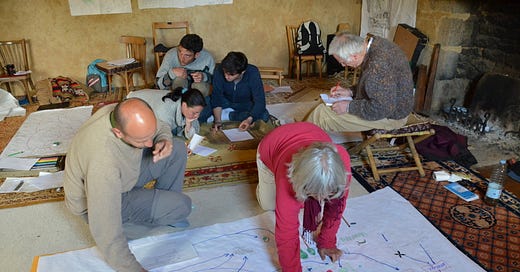Context
I have been involved with setting up the Université de Permaculture Francophone . I wrote about it here :
I got some fun feedback recently from some French Permaculture people, ‘francophone is colonialist’. Their argument was that promoting the French language is inherently a sort of post-colonial approach. It tends to encourage a France centered view of the world.
I was frankly quite surprised by this feedback. The main reason being that the majority of people working on the project come from ex-colonial countries in West Africa. NONE of them has talked about, mentioned nor worried about ‘francophone’ being colonialist. As far as they are concerned the horrors of colonialism have left the world with commonly shared languages. This can be used to help with the exchange of resources and mutual aid between different countries.
Another point is that people on or near the Europe still tend to have a Euro-centered worldview. I mentioned this in the first article. The world is shifting and we have to change our world views to accommodate this. Whilst I agree that we have to avoid giving the impression of initiating things that could be seen as ‘colonialist’ we also need to fight against being patronising. The people who gave me this feedback need to be more aware of this. The West African people working to develop the UPF are totally capable of noticing anything that might be ‘colonialist’ or racist. They are also well equipped to deal with it.
In any case, the UPF isn’t something that ‘France’ is dropping onto the francophone world. It isn’t another ‘white saviour’ project. It is a network of French speaking people run mainly by people who aren’t French and who don’t live in France. There are far fewer countries in Europe where French is a commonly used language than there are on other continents. This is reflected in the structure and management of the UPF.
Another and very important aspect of our work is putting into place flows of information and aide from French speaking countries towards Europe. The number of projects and the level of innovation happening in these countries is high. Techniques and strategies are being developed that people need in Europe as the climate changes.
Perhaps the best counter-argument to the ‘colonialist’ critique is that we are changing the viewpoint. It isn’t one of seeing the francophone world as France centered, it’s the opposite.
That said, here in France we have set up models of what a Permaculture designer is, what Permaculture is about and how it can be taught. This was all designed back in the early years of this century. Permaculture has exploded in France over the last two decades and we have managed to maintain the focus that a Permaculture Designer is first and foremost a Designer and secondly (if they want to be) a Permaculture teacher. Someone working as a designer or with a developed project is equipped to teach. If their activities work well and they earn their living from them then they should take time to teach. If their lifestyle and income depends on running expensive courses and not on their professional activities then their focus should be on getting things right at home before heading off to run courses.
This model was presented to the numerous people involved with the UPF. Not as ‘this is how you do it’ but as an example of a pathway that works here and could maybe be adapted for elsewhere. With an emphasis on ‘can be adapted’.
The project is moving ahead and we are starting to build a bank of teaching resources. As the emphasis is on ‘be a designer first and a teacher second we intend to also build up resources for help people with design work. This is very important as we try get people to understand that Permaculture is a professional discipline. It’s one that is completely adapted to helping us sort our failing systems, food, water, buildings, economies and all the rest.
I must admit that I do try to find something that is even more holistic and effective as Permaculture design, nothing so far.







To paraphrase Holmgren, maybe 'language is an equal opportunities employer'? Isnt a commonly shared understanding the simplest (maximum effect for minimum effort) way to achieve the goal of getting permaculture design understood and delivered ? The 'edge effect' of your west African colleagues surely outweighs the concerns of the 'worried wealthy'? Regards an efficient system where would you put properly applied (that includes everyone involved including the environment outside the managed space) 'Holistic Management'?